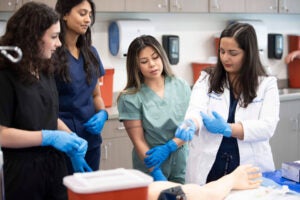Supervised Clinical Practice Experiences in each of the following disciplines and can be completed in any order (this will be assigned at the discretion of the program).
The program’s clinical team is responsible for assigning all clinical rotations to ensure high-quality clinical experiences and education. Students are not required to secure their own clinical sites or preceptors for required rotations.
While the program considers student preferences, the program cannot guarantee that all requests will be accommodated. Students should expect to complete four (4) Supervised Clinical Practice Experiences (SCPEs) within approximately 100 miles of their preferred geographic location, when feasible. The remaining four (4) SCPEs may require travel to sites more than 100 miles from their preferred location.
Clinical rotations are full-time obligations that on average will require 40 hours per week of student attendance. Additionally, students will have associated homework, patient logging and prep work during each rotation.
Background Checks and Other Screening Requirements
All clinical rotations require screening measures. Prior to final acceptance, those individuals offered a seat in the University of Pittsburgh Physician Assistant Studies Hybrid Program, will be required to complete a criminal background check, health assessment and drug screen. Matriculation as a student in the program is conditional upon these results. Failure to complete this process and submission of documents on or before the deadline given will result in forfeiture of your seat. If a student declines to undergo this process, or if findings of a grievous nature are revealed, the offer of admission will be revoked. During enrollment, repeat background checks, health and drug screens will be required. If a student declines to undergo a background check, health assessment or drug screen while enrolled in the program or if findings of a grievous nature are revealed, this will be grounds for dismissal from the program.
This program requires the student to complete portions of their education (e.g. clinical preceptorship, practicum) at facilities external to the University to meet requirements for graduation. Many of these external facilities require screening measures such as, but not limited to, background check, child abuse clearance, health appraisal, fingerprint-based background check and/or drug test prior to placement at the facility. The results of these requirements may limit and potentially eliminate placement options for the student which can, in turn, result in an inability to meet graduation requirements. Additionally, conviction of a misdemeanor, felony or felonious or illegal act may prevent the student from becoming credentialed and/or licensed to practice in the field.
PRACTICE AREAS
Internal Medicine
This supervised clinical practice experience focuses on the evaluation and management of patients in either/both inpatient and outpatient settings. Students learn to obtain an accurate and relevant history, conduct thorough physical examinations, recognize patterns of illness, and develop effective approaches to disease management. Students actively participate in the full spectrum of patient care, including formulating problem lists, engaging in daily rounds or clinical discussions, performing technical skills, contributing to the management of patient conditions, and assisting with care coordination, including discharge planning and follow-up care when applicable.
Family Medicine
This supervised clinical practice experience focuses on the evaluation and management of the ambulatory patient in a outpatient care setting. The student participates in the full range of outpatient care through the life span, including collecting pertinent patient data and the information from diagnostic studies, developing a differential diagnosis, oral and written case presentations, and formulating management plans including patient education, appropriate referral and follow-up care. This clinical rotation encompasses the comprehensive and longitudinal care of patients with a special emphasis on care of individuals in the context of families and communities.
Emergency Medicine
This supervised clinical practice experience focuses on the evaluation and management of patients in the emergency department setting. The student participates in the appropriate triage, stabilization, diagnosis and management of patients with urgent and emergent problems and develops skills in working with the pre-hospital emergency medical team and secondary referral systems.
Pediatrics
This supervised clinical practice experience focuses on the evaluation and care of infants and children in an ambulatory setting. The student participates in well-child preventative care, the evaluation and management of common pediatric problems, and the patient education of children and their caregivers.
Surgery
This supervised clinical practice experience gives the student many opportunities to evaluate and manage surgical patients. This experience is designed to augment, strengthen and refine the student’s surgical skills and ability to perform pre-operative, intra-operative and post-operative care. The student is expected to gain awareness of the contributions of other health professions in the overall delivery of surgical care as well as for the role a PA may play in its delivery.
Behavioral Health
This supervised clinical practice experience focuses on the evaluation and management of patients with psychiatric and behavioral health problems in ambulatory and/or inpatient settings. The student participates in psychiatric evaluations, monitoring of therapy, and appropriate referral to other health care professionals and facilities.
Obstetrical and Gynecological Medicine
This supervised clinical practice experience provides the PA student with practical clinical experience in evaluation and management of normal and abnormal conditions in OB/GYN. In addition, students will learn to provide prenatal and postpartum care, gynecologic care, family planning, health education, and counseling.
Elective
This experience is designed to provide the PA student with an elective opportunity in any medical or surgical specialty/subspecialty, academic setting, or other discipline.



